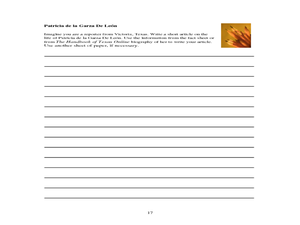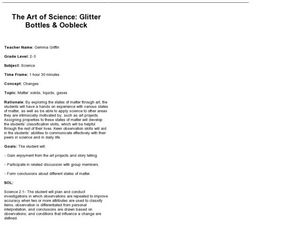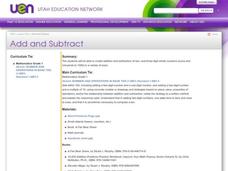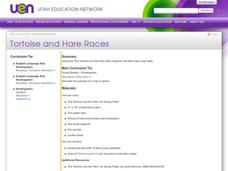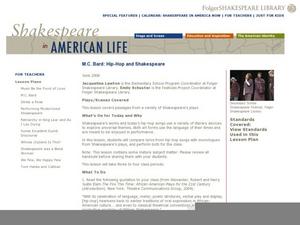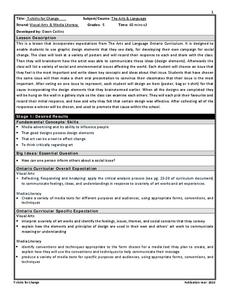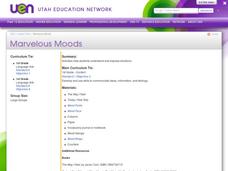Curated OER
Las Tejanas
Fourth graders recognize that the Tejanas were Texas women of Spanish-Mexican origin who contributed to the history of Texas. Students read and research the Tejanas women, complete an essay about a day in the life of a Tejanas woman ,and...
Curated OER
"Reviewing Facts Through 10" Lesson Plan
Explore the joy of math with you little learners! They practice creating math problems with numbers from a fact family using numbers 1-10. They work independently with a set of connecting cubes to aid them in creating number sentences...
Curated OER
Operation Spaghetti
Find the math in recipes. Young chefs will follow a recipe and investigate the total cost for materials. They measure amounts of food necessary for the recipe and compute the per person cost.
Curated OER
What's in a Name?
Students explore the plants that grow in Glacier National Park. In this plant biology lesson, students invite a guest speaker to speak about plants that grow in Glacier National Park, as well as the scientific names for the plants....
Curated OER
The Art of Science: Glitter Bottles and Oobleck
After having a class discussion on the three states of matter, young scientists utilize the wonderful substance, Oobleck in order to experience something that changes states of matter. They also create "sparkle jars" which...
Curated OER
Add and Subtract
Like the cubs in A Fair Bear to Share, your 2nd grade class will practice adding and subtracting double-digit numbers by grouping, regrouping, and sorting a collection of objects. This requires many resources, but it is well worth the...
Curated OER
Tortoise and Hare Races
Practice basic map skills with the story of The Tortoise and the Hare. After listening to the story, class members create a map that indicates the starting line, the path the animals took, where they stopped to rest, and the finish line....
Curated OER
M.C. Bard: Hip-Hop and Shakespeare
What is poetry? Does hip-hop qualify as poetry? Do Shakespeare's monologues qualify as poetry? Class members grapple with these questions as they examine the poetic elements and themes presented in different texts. Groups of four study...
Alabama Department of Archives and History
A Worse Death: War or Flu?
In a lesson that integrates history and mathematics, class members create graphs that compare military death statistics from World War I with those that resulted from the influenza pandemic of 1918.
Curated OER
T-shirts for Change
Can school children change the world? With a social or environmental issue in mind, 5th graders use what they know about advertising media to make t-shirts that have something to say. They research the issue they'd like to focus on,...
Curated OER
Marvelous Moods
It isn't always easy to tell another person how we feel; and little ones have an even more difficult time identifying and expressing their emotions. They get a chance to discuss and explore how they can express how they feel in different...
Curated OER
Finding Meaning in the Badge
Children who are three to five years old study two rank badges from the Qing dynasty to develop an understanding of social rank, language skills, and symbolism. The lesson plan is discussion-based and requires learners to compare and...
Read4Health
Piggybook: A Read4Health Lesson Plan
"You are pigs." With those three simple words, the lives of the Piggott family were changed forever. Read aloud the children's story Piggybook by Anthony Browne and teach your class the importance of personal responsibility,...
Smithsonian Institution
Solomon G. Brown: Letter Writing
Personal correspondence in the form of letters is not as common as it once was. This resource presents an opportunity for you to introduce your class to letter writing and cover topics in social studies. Learners read a letter written in...
EduGAINs
Go H2O! Investigating Residential Water Systems
Before your learners excuse themselves to get a drink at the water fountain, prompt them to think about where that water comes from. A middle school science lesson plan encourages groups to research their community's source of drinking...
Virginia Department of Education
Weather Patterns and Seasonal Changes
Get your class outside to observe their surroundings with a lesson highlighting weather patterns and seasonal changes. First, learners take a weather walk to survey how the weather affects animals, people, plants, and trees during...
Kenan Fellows
Letter Writing to Politicians on Environmental Issues
Let your voices be heard! Pupils research local and national environmental concerns using the Internet. Class members determine an issue they deem important and draft a letter to a local politician expressing their...
Center for Learning in Action
Properties of Balls
Enhance your states of matter lessons with a hands-on science investigation that compares six different balls' color, texture, size, weight, ability to bounce, and buoyancy.
Center for Learning in Action
Density
Explore the concept of density within states of matter—gases, liquids, and solids—through a group experiment in which young scientists test objects' texture, color, weight, size, and ability to sink or float.
Center for Learning in Action
Water—Changing States (Part 1)
Here is part one of a two-part lesson in which scholars investigate the changing states of water—liquid, solid, and gas. With grand conversation and up to three demonstrations, learners make predictions about what they think will happen...
Center for Learning in Action
Water – Changing States (Part 2)
Here is part two of a two-part lesson plan in which scholars investigate the changing states of water—liquid, solid, and gas—and how energy from heat changes its molecules. With grand conversation, two demonstrations, and one...
Center for Learning in Action
Investigating Physical and Chemical Changes
Super scientists visit ten stations to predict, observe, and draw conclusions about the physical and chemical changes that occur when different states of matter—liquid, solid, and gas—are placed under a variety of conditions. To...
Missouri Department of Elementary
The Successful Student: Let’s Review for Better Achievement
Study skills, time management skills, and test taking-skills are important attributes for both the classroom and the real world. Focus on these learning skills in a lesson that reviews how to be a good student and make better grades.
Channel Islands Film
Step Into the Shoes
Small groups create skits that illustrate the different perspectives of those involved in the transitioning of Santa Rose island from private ownership to National Park.


